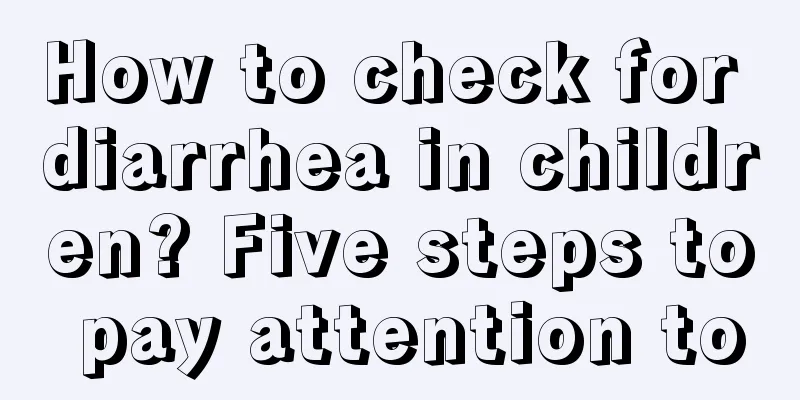How to check for diarrhea in children? Five steps to pay attention to

|
Diarrhea in children is a common phenomenon, and many parents need to pay attention to the degree of diarrhea in their children. So, how to check for diarrhea in children? How to check diarrhea in childrenNo.1 Observe body temperature Among diarrhea cases, the most common type is diarrhea caused by bacteria, viruses or toxins produced by bacteria entering the body due to unclean diet. This is called "infectious diarrhea", accounting for about 85% of diarrhea cases. This type of diarrhea is prone to abnormal body temperature, manifested as a moderate fever (about 38.5 degrees), and the fever symptoms may appear earlier than diarrhea or at the beginning of diarrhea. At the same time, children with infectious diarrhea will also show signs of not liking to play, not wanting to eat, being annoying, crying, and being listless. Parents don't need to be too anxious about this. However, when a child has a high fever (above 39 degrees) before diarrhea (or when the number of diarrhea episodes is small at the beginning), it should be taken seriously and timely medical treatment should be sought to prevent the serious condition of toxic dysentery. No.2 Observe the mental state That is, observe whether the child with diarrhea has symptoms such as mental depression, drowsiness, convulsions, seizures, convulsions, coma, etc. These symptoms are different from the weakness, fatigue, love of sleep and easy awakening of children when they have diarrhea. They are manifestations of mental and consciousness disorders. Another manifestation is projectile vomiting, which means vomiting as soon as you open your mouth, rather than vomiting due to nausea or after taking medicine. If you find that your child has similar mental symptoms, you should see a doctor immediately. No.3 Observe the characteristics and frequency of stool Diarrhea in young children is common with loose stools, watery stools, egg-drop-shaped stools, yellow-green stools, or stools with a small amount of mucus. Diarrhea occurs about 5 times a day, with a small amount of stool and no obvious dehydration. However, if there is blood in the stool, or bloody stools, or pus-blooded stools, and the amount of stool is small each time, and the child is unwilling to get up from the potty, it may be dysentery, or diarrhea caused by Aspergillus jejuni, or diarrhea caused by hemorrhagic Escherichia coli, and medical attention should be sought immediately. If a child has frequent diarrhea and a large amount of stool, the body will lose a lot of water and dehydration symptoms will occur easily. See a doctor for infusion in time to prevent acidosis. No.4 Observe whether there are any complications When a child has diarrhea, he or she may experience high fever, headache, projectile vomiting; decreased urine volume with protein in the urine; weakness in the limbs, especially the lower limbs; difficulty breathing; and skin rash and ecchymosis. These symptoms are often early manifestations of complications and should be treated promptly. No.5 Observe drug effects and reactions Children with mild diarrhea symptoms can buy medicine for treatment on their own. However, if the self-selected medicine is ineffective within 2 days, or if adverse drug reactions occur, the medicine should be stopped immediately and the doctor should be consulted. The diet of children with diarrhea should be mainly soft and nutritious meals. Infants who have not been weaned can still be breastfed; try to drink more water, and it is better to add a small amount of salt to the water. In addition, parents who care for children with diarrhea should wash their hands at any time to prevent the spread of germs. Causes of diarrhea in childrenIt is mainly caused by improper feeding and eating disorders. For example, insufficient breast milk or bottle feeding, feeding children too early and too much porridge and powder paste, too much carbohydrates can cause fermentation and digestive disorders. Failure to add supplementary food on time and suddenly adding food before weaning to change the food ingredients can cause digestive disorders and diarrhea due to inability to adapt. Diarrhea can also be caused by irregular feeding, or excessive food intake and coldness that affect the digestive function of the gastrointestinal tract. Autumn diarrhea: The peak period of rotavirus diarrhea is from October to February of the following year. Rotavirus is prone to outbreaks in dry and cold seasons. Since the local immunity and intestinal digestive system of infants and young children aged 6 months to 2 years are not fully developed, they are easily infected with rotavirus and develop diarrhea. Dinggui Umbilical Patch takes advantage of the physiological characteristics of the strong absorption function of the umbilicus of children. It uses a unique method of sticking to the navel, strengthening the spleen and stomach to treat diarrhea and aid digestion, and regulates the gastrointestinal tract as a whole, which not only avoids the pain of injections and medication, but also promotes the gastrointestinal health of children, and is of far-reaching significance to the physical and mental health of children. Don't do these three things when your child has diarrhea1. Stop diarrhea immediately after diarrhea Some mothers see their children vomiting and having diarrhea and are very weak, so they will immediately stop diarrhea. In fact, diarrhea is a self-protective reaction of the intestines to excrete waste. Through diarrhea, bacteria and other harmful substances can be eliminated. Therefore, diarrhea is not necessarily a bad thing. The focus of treating diarrhea should be to find the cause of diarrhea and solve it, rather than simply stop diarrhea. When your baby has diarrhea, you should pay attention to preventing dehydration and replenishing nutrition in time, as well as using appropriate medications based on the cause of the diarrhea, without deliberately stopping the diarrhea. 2. Antibiotics for diarrhea In autumn, babies often have diarrhea that starts with a fever, followed by diarrhea within 24 hours, which may occur several times a day or dozens of times a day. The stool is thin and watery or egg drop soup-like. If your baby has diarrhea, mothers should not be too anxious. You can consult a pigeon doctor if you have time. Many mothers will choose to give their babies antibiotics at this time. But in fact, 70% of babies with acute watery diarrhea do not need to use antibiotics. Generally, they can take intestinal mucosal protectants, such as Smecta, which can fix and absorb harmful bacteria and their toxins, making it difficult for pathogens to invade the intestinal wall, protecting and promoting intestinal mucosal regeneration and repair. The abuse of antibacterial drugs will cause the continuous increase of bacterial resistant strains, and it can also cause secondary intestinal flora imbalance, fungal enteritis, etc., which will prolong or aggravate diarrhea. Which types of diarrhea require antibiotics? Diarrhea that requires antibiotics include: bacillary dysentery, cholera, salmonella enteritis in infants and young children, various severe diarrhea, and diarrhea in people with low immune function. Generally speaking, if the stool contains pus and blood, antibiotics are needed; children under 12 years old with diarrhea who suddenly have a fever, pale face, cold limbs, and tight muscles should also use antibiotics for such dysentery. 3. Baby should fast after diarrhea For babies with acute diarrhea, elders often fast the children. However, long periods of hunger are not only not conducive to the maintenance of nutrition for the children, but also will further deteriorate the nutritional status of those who are already malnourished. It will also affect the repair and renewal of the intestinal mucosa, reduce the absorption capacity of the small intestine, reduce immunity, and cause repeated infections, which will eventually lead to a vicious cycle of "diarrhea, malnutrition, and diarrhea again." Some children will cry and fuss due to hunger and fasting, and even suffer from hypoglycemia and significant weight loss. The current proposal is to continue breastfeeding for acute diarrhea. Babies who continue to be fed will have a faster recovery of appetite, and the frequency of diarrhea and vomiting will not increase. In addition, their physical strength will recover earlier, and their resistance to disease will be stronger, which is conducive to recovery from the disease. What to eat for children with diarrhea1. Carrot puree Ingredients: 1 carrot. Method: Take an appropriate amount of fresh carrots, wash and chop them, add water and boil or steam them until soft, then take out the carrots, mash them into a paste with a spoon, and then add a small amount of carrot boiling water. The carrot boiling water should be reserved for later use. Do not add sugar to the carrot puree to avoid aggravating diarrhea. When eating, add 5 to 10 grams of carrot puree for every 100 ml of carrot water. Efficacy: auxiliary treatment of diarrhea in infants and young children, with significant effect. 2. Burnt Rice Paste Ingredients: millet and sugar in appropriate amounts. Preparation method: Take an appropriate amount of millet, grind it into powder, put it in a pot and fry it over low heat until it turns slightly yellow. When eating, add an appropriate amount of water and sugar to the burnt rice paste and cook it into a paste. Take it after it cools slightly, 2 to 3 times a day on average. Efficacy: Scorched rice paste has the function of absorbing corrupt substances in the intestinal cavity, so it has the effect of detoxifying and stopping diarrhea. |
<<: The breastfeeding journey of a new dairy cow mother
>>: Why does my baby always pull his ears? 6 reasons for pulling ears
Recommend
Can a laundry bag clean clothes? What is the function of a laundry bag?
Nowadays, many people use laundry bags to wash cl...
How to train your baby to eat by himself? How to train your baby to eat by himself
When babies are young, they need to be fed by the...
Can pregnant women use Liushen Flower Dew? Can pregnant women smell Liushen Flower Dew?
Floral water contains alcohol, so can pregnant wo...
At what age can a baby eat by himself? How to make a baby love eating?
Learning to eat by yourself is a stage that your ...
What happened when a boy hugged and kissed the singing girl at a KTV? How can we improve children's moral cultivation?
Nowadays, it is very common for children to have ...
What are the methods for removing phlegm from infants and young children? Four methods are recommended
Many infants and young children have phlegm in th...
How to train your baby's grasping ability when he can't grasp things
After the baby is born, he needs to exercise his ...
What are the symptoms of neonatal colic? What does neonatal colic look like?
Newborns cannot express themselves verbally soon ...
What are the conditions for IVF? Who is suitable for IVF?
IVF is a medical method for infertile couples. It...
What are some tips for caring for your baby's clothes when the seasons change?
When the seasons change, the temperature differen...
Can I wean my baby in September? Is it a good idea to wean my baby in September?
Weaning is a stage that every baby of the right a...
Can I take birth control pills while breastfeeding? What should I do if I do?
If you don't take any contraceptive measures ...
How to strengthen the education of children who are impetuous and impatient? How to do psychological education for children?
The issue of children's education has always ...
How to restore the uterus after childbirth How to promote uterine recovery
After a woman becomes pregnant and gives birth, m...
Newborns are startled when they sleep. Reasons why newborns don't sleep well
Newborns spend most of the day sleeping. Many mot...









